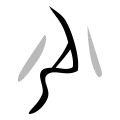Radical 26
Radical 26 or radical seal (卩部) meaning "seal" is one of the 23 Kangxi radicals (214 radicals total) composed of two strokes.
| 卩 | ||
|---|---|---|
| ||
| 卩 (U+5369) "seal" | ||
| Pronunciations | ||
| Pinyin: | jié | |
| Bopomofo: | ㄐㄧㄝˊ | |
| Wade–Giles: | chieh2 | |
| Cantonese Yale: | jit | |
| Jyutping: | zit3 | |
| Pe̍h-ōe-jī: | chiat | |
| Japanese Kana: | セツ setsu (on'yomi) わりふ warifu (kun'yomi) | |
| Sino-Korean: | 절 jeol | |
| Names | ||
| Chinese name(s): | (卩) 單耳旁/单耳旁 dān'ěrpáng (卩) 單耳刀/单耳刀 dān'ěrdāo (㔾) 卷字底 juǎnzìdǐ (㔾, Simp.) 仓字底 cāngzìdǐ | |
| Japanese name(s): | 節旁/ふしづくり fushizukuri まげわりふ magewarifu わりふ warifu | |
| Hangul: | 무릎마디 mureup-madi | |
| Stroke order animation | ||
 | ||
It usually transforms as 㔾 when appearing at the bottom of a Chinese character.
In the Kangxi Dictionary, there are 40 characters (out of 49,030) to be found under this radical.
卩 is also the 21st indexing component in the Table of Indexing Chinese Character Components predominantly adopted by Simplified Chinese dictionaries published in mainland China, with 㔾 being its associated indexing component.
Evolution
 Oracle bone script character
Oracle bone script character Bronze script character
Bronze script character Small seal script character
Small seal script character
Derived characters
| Strokes | Characters |
|---|---|
| +0 | 卩 |
| +1 | 卪 |
| +2 | 卫SC (=衛/衞 -> 行) 卬 |
| +3 | 卭 卮 卯 |
| +4 | 印 危 |
| +5 | 卲 即 却SC/JP (=卻) 卵 |
| +6 | 卶 卷 卸 卺 |
| +7 | 卹 卻 卼 卽 |
| +8 | 卿 |
| +9 | 卾 |
| +11 | 厀 厁 |
In Unihan database, 㔾 is indexed radical 26 + 1 stroke (3 strokes in total), with the extra stroke unspecified.[1] Traditionally, this character or component consists of only two strokes (𠃌乚).
Literature
- Fazzioli, Edoardo (1987). Chinese calligraphy : from pictograph to ideogram : the history of 214 essential Chinese/Japanese characters. calligraphy by Rebecca Hon Ko. New York: Abbeville Press. ISBN 0-89659-774-1.
- Lunde, Ken (Jan 5, 2009). "Appendix J: Japanese Character Sets" (PDF). CJKV Information Processing: Chinese, Japanese, Korean & Vietnamese Computing (Second ed.). Sebastopol, Calif.: O'Reilly Media. ISBN 978-0-596-51447-1.
References
This article is issued from Wikipedia. The text is licensed under Creative Commons - Attribution - Sharealike. Additional terms may apply for the media files.